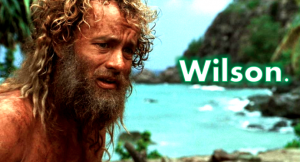By Monica Pastor
Robinson Crusoe has managed to emerge as a 21st century household name, transcending multiple mediums and time periods. It’s inspired 18th century sequels, a crazy bearded Tom Hanks and the foolish characters on Gilligan’s Island. Why did this work establish such a timeless legacy and go on to be one of the most widely published books in history and not poor Roxana? Robinson Crusoe is a captivating adventure novel, filled with action-packed shipwrecks, famished cannibals and ruthless mutineers. György Lukács does not view this entertaining quality of the novel admirably and rather, sees it creating caricatures and narrowing the reality of the content. But Defoe’s realistic fiction shares more traits with the empirical epic than Lukacs might think. While it is impossible to cram an absolutely perfect snapshot of the transformational, modernizing 18th century England into a hundreds of pages, this novel runs somewhat parallel to the dramatic shifts in Defoe’s era. The straightforward narration style, action-driven plot and Crusoe’s religious/moral contradictions present the narrative objectively, establishing Crusoe as an unbiased pair of eyes. He gets close to filling the shoes of a modern day Homer. Is that what has enabled Robinson Crusoe to be recycled through multiple mediums and re-introduced into 21st century discussion? Is it a combination of borrowing from the epic’s objectivity and the novel’s universal lessons on human nature ? Or does Lukács win and Robinson Crusoe is just a dang good piece of entertainment?

